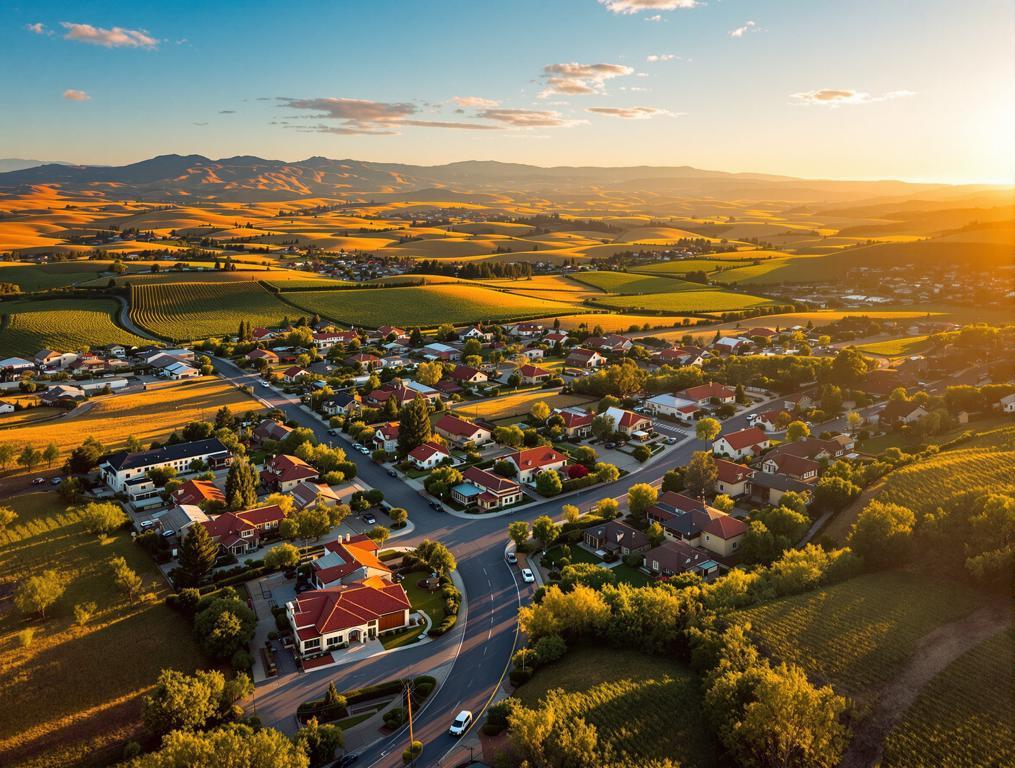The sun dips behind the Horse Heaven Hills as I pull into Prosser, Washington. My rental car thermometer reads 98°F – typical for a June evening in wine country. What’s not typical is what surrounds me: a town of just 6,518 residents that somehow supports more than 30 wineries. I’ve come 3 hours east of Seattle to discover why this tiny dot on the map has quietly become the most concentrated wine town in America’s second-largest wine-producing state.
The contrast is immediate. No tour buses. No reservation-only tastings with $50 minimum purchases. Just quiet tasting rooms where winemakers themselves pour your flight.
America’s most concentrated wine town: 30+ wineries with just 6,518 residents
Prosser’s extraordinary winery-to-resident ratio makes Napa Valley look overcrowded. With one winery per 217 residents, it offers what few American wine destinations can: authenticity without commercialization.
“I’ve been to Sonoma, Paso Robles, and the Finger Lakes. Here, I’m the only visitor in most tasting rooms, getting one-on-one time with actual winemakers instead of tasting room associates,” a visitor tells me. “It feels like discovering Napa 40 years ago.”
The town’s Vintner’s Village features 12 walkable tasting rooms clustered together – think of it as a wine mall where each storefront offers a different terroir expression. Unlike rural businesses that reinvented themselves, these wineries built on Prosser’s natural advantages.
What makes this concentration possible is Prosser’s location in the Yakima Valley, blessed with 300+ days of sunshine and mineral-rich soils that rival European wine regions. The town is growing steadily at 1.18% annually but hasn’t lost its agricultural soul.
The birthplace of Washington’s wine industry dates back generations
Unlike some towns with manufactured identities, Prosser’s claim as the “Birthplace of Washington Wine” is well-documented. The Yakima Valley received official American Viticultural Area (AVA) status in 1983, making it one of America’s oldest recognized wine regions.
Much like certain Texas towns preserving cultural heritage, Prosser maintains its winemaking traditions while neighboring regions chase trends. Here, fourth-generation farmers work alongside first-generation winemakers.
At Alexandria Nicole Cellars, I sample a $12 tasting flight that includes their award-winning Cabernet Sauvignon. In Napa, this experience would cost triple the price and require a reservation weeks in advance.
Rhône Valley flavors without European prices or crowds
Prosser’s climate mirrors France’s Rhône Valley, producing wines with similar profiles but at half the price. While some destinations see overwhelming tourism numbers, Prosser maintains a balance between visitors and local character.
“We’re making world-class wines without world-class prices. The same bottle that costs $70 in Napa or $90 in France sells for $30-40 here because we don’t have the marketing overhead or tourism markup.”
Beyond wine, Prosser offers experiences you won’t find in commercialized wine regions. At Sage Bluff Alpacas, visitors can tour a working alpaca farm. Chukar Cherries, a 40-year local institution, offers free tastings of chocolate-covered cherries produced from local orchards.
Experience authentic wine country this summer (before everyone else discovers it)
Summer 2025 is the perfect time to visit before harvest crowds arrive in September. Temperatures hover around 85-95°F with cool evenings ideal for outdoor dining at places like Wine O’Clock, where garden-fresh produce pairs with local wines.
Similar to small towns preserving authentic American traditions, Prosser maintains a genuine wine country experience that’s increasingly rare.
The best access is via Interstate 82, with ample free parking throughout town. Visit tasting rooms between 11am-2pm to have them virtually to yourself, or come for Food Truck Fridays at Mercer Wine Estates for a more social experience.
As my weekend in Prosser ends, I realize what makes it special isn’t just the wine – it’s the absence of what plagues famous wine regions: crowds, pretension, and inflated prices. Like finding an unsigned band before they hit the big time, there’s a certain traveler’s confidence in discovering Prosser now, while it still belongs more to locals than tourists.
